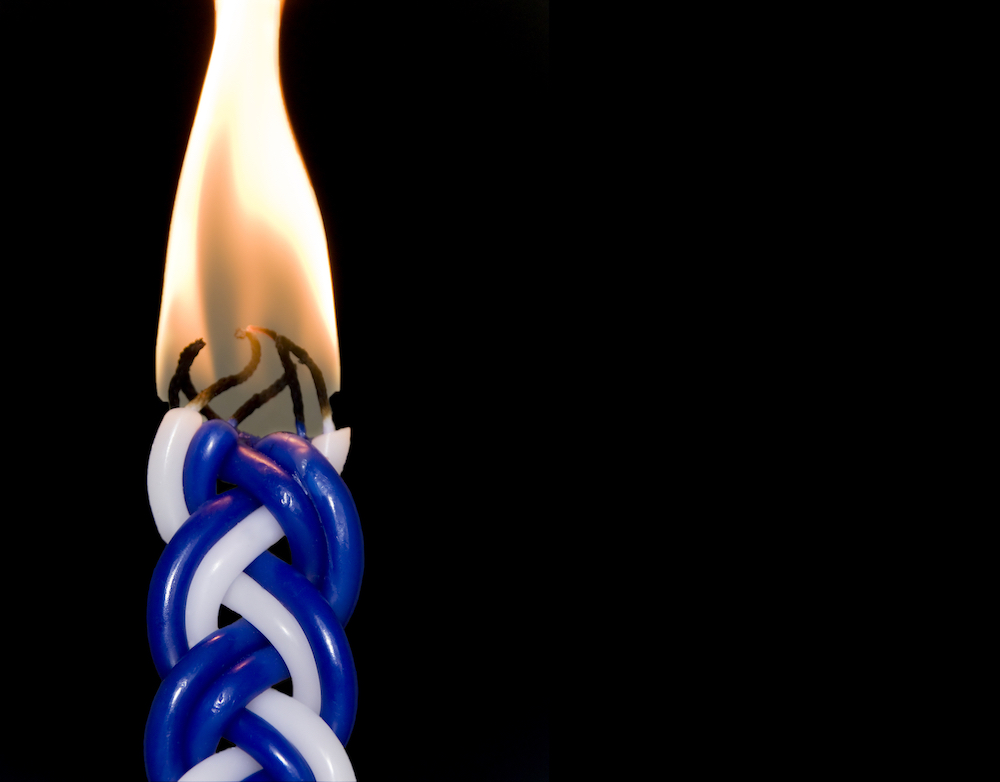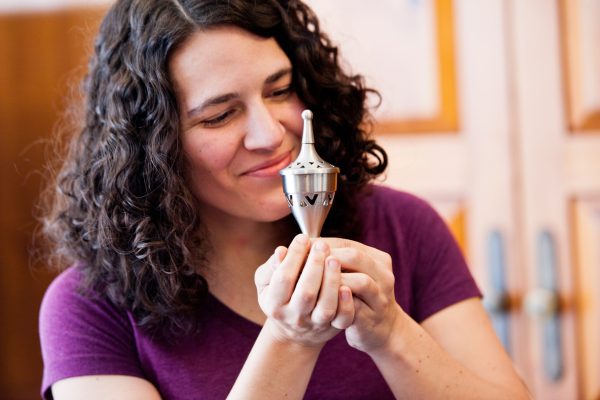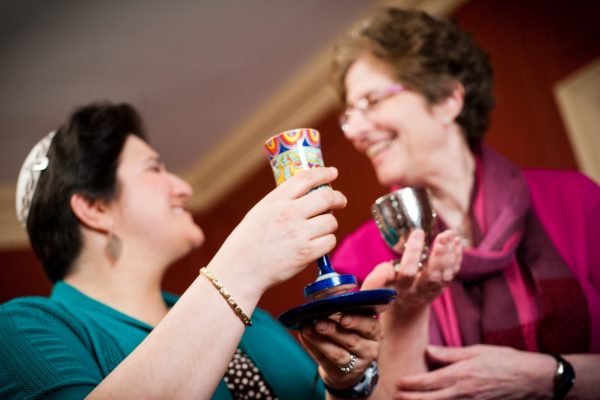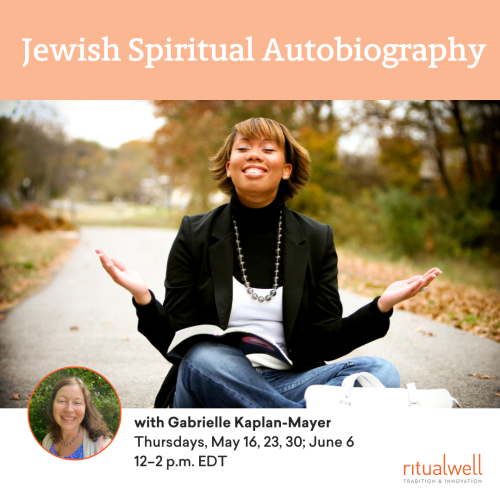With friends and family gathered around, the couple lights the havdalahLit. Separation A ceremony performed on Saturday night to mark the end of Shabbat and the beginning of the week, using wine, a braided candle, and sweet-smelling spices. candle. It may be held by the woman or passed among the participants as they speak.
A participant begins by reciting the traditional opening paragraph:
“Behold, God is our deliverance. I shall trust in God, and not be afraid. The Eternal is our strength and song. God shall always be with us as our protector, as it says, And you shall draw waters in joy, from the springs of deliverance. It is God who will deliver us; God’s blessings are upon us. Selah. God is with us, the God of JacobLit. heel Jacob is the third patriarch, son of Isaac and Rebecca, and father to the twelve tribes of Israel. More than any of the other patriarchs, Jacob wrestles with God and evolves from a deceitful, deal-making young man to a mature, faithful partner to God. His Hebrew name is Yaakov. is our fortress. Happy is the one who trusts in God. God of salvation, You answer us whenever we call. And for the Jews there was light and joy, gladness and desire. So may it be for us. I lift the cup of deliverance, and call upon the name of God.”
Participant (taking the candle):
When ShabbatShabbat is the Sabbath day, the Day of Rest, and is observed from Friday night through Saturday night. Is set aside from the rest of the week both in honor of the fact that God rested on the seventh day after creating the world. On Shabbat, many Jews observe prohibitions from various activities designated as work. Shabbat is traditionally observed with festive meals, wine, challah, prayers, the reading and studying of Torah, conjugal relations, family time, and time with friends. begins, we light two or more candles. They stand side by side, as a pair, but each alone. When Shabbat ends, we also light two or more candles. But these are bound and wound around each other, joined by the spirit of oneness of Shabbat, casting their light together as one. Like them, we gather now, at the close of Shabbat, joining with you [name the ones who suffered the loss] at this moment of sadness. Through our love and our caring, now and for a hundred tomorrows, may you know the blessings of comfort and strength.
The couple steps forward, receives the candle, and recites:
Adonai, we are blessed by the presence of our loved ones tonight. You, too, be with us to mend our broken hopes. Give us the faith to turn to You in our times of hurt. Give us the desire to turn to each other in our times of sadness. Let the rays of light that flow from this candle weave themselves into a garment of hope for my husband/wife and me, and may we soon once again see joy in each other’s eyes.
Participant:
“And HannahHannah is the mother of the prophet Samuel, who, through her prayers, is rewarded a child. She herself is also considered a prophet. Hannah's intense devotional style of prayer becomes the model, in rabbinic Judaism, for prayer in general. arose after eating and drinking at Shiloh. She was desperately sad and prayed to God; and she cried and cried. Eli watched her mouth while Hannah prayed silently. Only her lips moved, but she did not make a sound. Eli thought her drunk and berated her, ‘How long will you go on in this drunkenness? Remove the wine from your ways.’ But Hannah replied, ‘Oh no, my lord, I have not drunk wine or any strong drink. I speak this way out of my anguish and distress.’ And Eli replied, ‘Go in peace and may the God of IsraelLit. ''the one who struggles with God.'' Israel means many things. It is first used with reference to Jacob, whose name is changed to Israel (Genesis 32:29), the one who struggles with God. Jacob's children, the Jewish people, become B'nai Israel, the children of Israel. The name also refers to the land of Israel and the State of Israel. grant you what you have asked.'”
(If the couple hopes for another pregnancy, the following paragraphs should be added.)
Participant:
“Elkanah knew his wife Hannah, and God remembered Hannah, and she conceived, and at the turn of the year she bore a son…. When she weaned him, she took him up with her to Shiloh, along with meat, flour, and a jug of wine….”
Participant raises the cup:
This is Hannah’s cup, which fortified her when she turned to God, beseeching the Eternal to give her a child. Drink from it as Hannah did, and we will say to you as Eli did to her “May the God of Israel grant what you have asked.”
If the couple hopes for another pregnancy, the participant continues:
May the time come when we may once again gather here with you, with food and flour and a jug of wine, to drink from Hannah’s cup, filled to the brim with her words of joy.
Couple receives the cup of grape juice, recites the blessing, and drinks:
Participant holds up the spice container and says:
On Shabbat, we are endowed with a second soul, a neshamahSoul yeteirah, which leaves with the last light of Shabbat. To revive us as we endure this loss of soul, we smell the fragrance of at least two spices.
On this Saturday night, may these spices sustain you after the loss of the one you hoped and dreamed would be your additional soul.
Couple holds the spice box and recite:
“Let God anoint us with the oil of gladness, and let myrrh and aloe and cassia be our garments.” (Based on Ps. 45:9)
All recite blessing over the spices:
Pass around the spice box for all to sniff.
Participant takes the candle and says:
Light is the beginning of all life, for God’s first words of creation were “Let there be light.” “Adonai is my light and my help” (Ps. 27:1). “You are the source of all life; by Your light do we see light.” (Ps. 36: 10)
Couple takes the candle and say:
Couple recites the blessing over the light:
Everyone looks at the shadows cast by the glow of the candle.
Participant:
ElijahElijah is a biblical prophet who is said never to have died. There are therefore many legends associated with Elijah. In the Talmud, unresolved arguments will be resolved when Elijah comes. He will herald the coming of the messiah. In Jewish ritual, Elijah is a liminal figure, arriving at moments of danger and transition – at a brit milah, a chair is put out for him, a cup is poured for Elijah at the Passover seder, and he is invoked at havdalah. His Hebrew name is Eliyahu. the prophet is a symbol of hope amid despair; of God’s presence in a wasteland; of tomorrow when we cannot see the end of today. Just as we invoke the presence of Elijah at every brit milahLit. Covenant of circumcision. As a sign of the covenant, God commanded Abraham to circumcise himself and his descendants. An infant boy is circumcised on the eighth day of his life, often at home or in synagogue. A festive meal follows. (ritual circumcision), so too tradition encourages us to invoke the name of Elijah at Havdalah. Through the stories of Elijah, we are led to believe that we, too, merit everyday miracles. We end this ceremony of Havdalah and healing by singing of Elijah.
All sing:
Used with permission of the author. Printed in Tears of Sorrow, Seeds of Hope by Nina Beth Cardin (Woodstock, VT: Jewish Lights Publishing, 1999).













